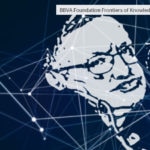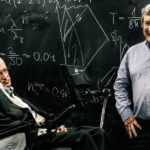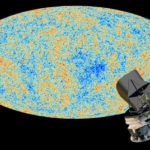Searching for the seeds of the galaxies
“Ideas about cosmology have greatly changed in the last 60 years. At the beginning of this century it was accepted without question that the Universe was essentially uniform and static. […] Most people preferred to believe that the Universe had existed forever, because this avoided awkward questions about the initial data and about what happened before the beginning."

These words were written in 1982 by theBritish physicist Stephen Hawking in the introduction to the proceedings of a workshop he co-organized that year in Nuffield, United Kingdom, which was attended by some of the world’s leading theoretical physicists.
The great change in cosmology that Hawking refers to is the consolidation of the Big Bang model: a new discovery had shown that once everything had been compressed into a dense, hot, microscopic speck, which at some point began expanding. Although this seemed incontrovertible, several non-trivial issues remained to be solved – hence the calling of the Nuffield workshop.
One such issue was the origin of the galaxies, concretely how and why had all that matter begun to accumulate? In Nuffield, Hawking put his own prediction on the table: a phenomenon termed “quantum fluctuations” envisioned in quantum physics was responsible for generating the “seeds” of matter in the newborn Universe that would eventually grow into the galaxies. One year earlier, another two physicists, the Russians Viatcheslav Mukhanov and Gennady Chibisov, had reached the same conclusion by another route.

Stephen Hawking and Viatcheslav Mukhanov, BBVA Foundation Frontiers of Knowledge Award in Basic Sciences. Picture by Carlos Luján / XL Vocento
The same physics that is responsible for the microscopic structure of matter might be responsible for the structure of the whole Universe — Mukhanov
Back then no one believed that the existence of quantum fluctuations could ever be confirmed. But in the late 1990s, not long after Mukhanov, Chibisov (who died in 2008) and Stephen Hawking came up with their predictions, successive generations of sensitive, sophisticated telescopes began gathering the data the theorists were crying out for, and which would finally validate the theory. It is for this insight that Hawking and Mukhanov have been distinguished with the BBVA Foundation Frontiers of Knowledge Award in Basic Sciences.
The physicists’ unique achievement, the jury explains, was to connect quantum physics, which describes the behavior of matter at the smallest of scales, with the science of the cosmos. As Mukhanov relates, “we came to the idea that the physics responsible for the structure of matter at minute, atomic scales might also be behind the Universe’s large-scale structure. It sounds crazy, but we realized that the Universe was once extremely small so quantum physics could teach us how the embryos of the galaxies came to be formed.”

Viatcheslav Mukhanov (Kanash, former USSR, 1952) is now Professor of Cosmology at the Ludwig Maximilian University of Munich, Germany. “Never in my wildest dreams,” he says, did he imagine that his predictions would be experimentally confirmed, though he declares himself thrilled about the outcome.
Mukhanov was keen on physics from early childhood. This was “no thanks to the classes at school, which were pretty bad,” but due to a “magnificent bookshop” where he would acquire books by the great physicists “for intellectual pleasure, with no thought of becoming a scientist.” No one in his family had gone to university. But then Russian mathematician Andrey Kolmogorov founded a math school in Moscow for talented youngsters from the provinces, where Mukhanov enrolled at age 17. His interest in “the sky, the stars and general relativity” drew him to the group led by 2003 Nobel laureate Vitaly Ginzburg.
He published his paper with Chibisov in 1981, when still a doctorate student in a group boasting eminent theorists, among them Yakov Zeldovich, one of the fathers of the atom bomb. “I didn’t work to make the experiments happy, I worked to make Zeldovich happy,” remarks Mukhanov jokingly, while stressing the scientific freedom the group enjoyed, even during the Soviet regime.
In the early 1990s, with the collapse of the USSR, he took up a postdoctoral place at ETH Zurich, where he stayed for five years before making the move to LMU Munich.

The space observatory Planck from the European Space Agency (ESA) confirmed in 2013 the theories proved by Hawking and Mukhanov in the 80s on the origin of the galaxies
We need more intellectual rigor like this in public life to help us with global challenges — Hawking
Stephen Hawking (Oxford, United Kingdom, 1942) entered University College Oxford at age 17, but academically failed to shine. In fact to achieve his goal of studying cosmology he had to take an oral exam to offset his lackluster results in the written tests.
In 1962, he enrolled at the University of Cambridge, drawn by the presence of Fred Hoyle – pioneer of moderncosmology and leader of the camp contrary to the Big Bang theory, an expression he coined in a spirit of gentle mockery.
One year later, he was diagnosed with a motor neuron disease, and doctors gave him no more than two years to live. Hawking, however, pressed on with his research, to become a theoretical physicist of world renown.
In 1979, he took up the Lucasian Professorship of Mathematics at Cambridge, founded in 1663 with Isaac Newton as its second incumbent. He remained there until retiring from the post in 2009, when he became Director of Research at the university’s Centre for Theoretical Cosmology. Hawking is also the best-selling author of works of popular science such as A Brief History of Time.